C.W. Thomas's Blog, page 4
May 23, 2016
From Un-me To Real Me: How Stephenie Meyer Killed My Muse
Part Five
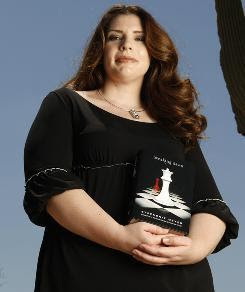 For fourteen years I had been obsessed with writing. I had written about nine books, two of which had been published and a third had just spent three years in limbo with a publisher that didn't fulfill its end of the bargain. My co-author and I were at odds and my "writing career" was not what I had hoped it would be.
For fourteen years I had been obsessed with writing. I had written about nine books, two of which had been published and a third had just spent three years in limbo with a publisher that didn't fulfill its end of the bargain. My co-author and I were at odds and my "writing career" was not what I had hoped it would be.
I was discouraged, depressed, dissatisfied, and done.
Along came Stephenie Meyer in 2007 with a teen vampire novel called Twilight. I don't know what Satanic ritual she performed to gain such widespread approval, but for some inexplicable reason her horribly written books took the world by storm. When the movies began to hit in 2008, Meyer made millions off her three novels and four films over the next five years.
Here's the thing that pisses me off about Stephenie Meyer. Her books suck, and yet teenagers eat them up like candy.
I agree with author Stephen King, who, in an interview with USA Weekend , said, "The real difference is that Jo Rowling is a terrific writer and Stephenie Meyer can't write worth a darn. She's not very good."
The Great Satan of Literature?Before you ask, yes, I read the first book in her series, Twilight. I had to see for myself what all the fuss was about. And the honest truth is the books were even worse than I expected. I could spend hours picking apart Meyer's inability to structure a story, design characters of any depth, craft an intriguing romance, or write an action scene, not to mention her abuse of the English langue, which was horrifying.
Did I think my writing was superior? Absolutely! And I can point to a hundred other indie authors whose work is superior to mine who are worth all the attention Meyer got and much more.
Here was Stephenie Meyer, a middle-aged soccer mom with no previous interest in writing, churning out the most basic, badly written, adjective-stuffed melodramatic teenage drivel and making millions, and yet thousands of other writers, myself included, with much better ideas and years of practice couldn't get a single publisher to take a chance on us.
I remember back in 1998 when Director Michael Bay release Armageddon, People Magazine published a story on why some big-shots in Hollywood viewed Michael Bay as "the great satan of movies." Their point was simple. Michael Bay's over-stylized and empty-headed approach to filmmaking was devaluing the craft.
 Michael Bay says, "Talk to the hand!"
Michael Bay says, "Talk to the hand!"
as he walks to the bank.
I'm calling out Stephenie Meyer—though I am hardly the first to do so—to say that she's doing the same thing to the craft of writing, her and the slew of copycats and wannabes she inspired—yes, I'm thinking about you E.L. James.
The Real ProblemBut Meyer's success put a big spotlight on the real problem—big publishers.
I began to realize that publishers aren't seeking quality work anymore. They're looking to fill a predetermined novel mold established by a marketing team to guarantee major sales. They don't care about content or genre or how good or bad an author is at their craft. They know the market and they want content to fill what the market wants.
Author Alan Moore said in November, 2015, “Publishing today is a complete mess. I know brilliant authors who can’t get their books published." He went on to explain that the reason is because publishing houses are afraid of taking risks on fiction. Moore’s solution? “Publish yourself. Don’t rely upon other people.” (Alan Moore Advises New Writers to Self-Publish Because Big Publishers Suck.)
Big publishers just want to meet the market demands and make as much money as they can in the process.
This is a major shift from just a few decades ago when publishing companies were all about discovering "the next great American novel." It's not really their fault either. With the rise of self-publishing and digital books, combined with the increasing cost of paper and printing, publishers started realizing that their old way of doing things was no longer working. Editors no longer had the time to sift through stacks of manuscripts to determine which novel was most worthy of publication. The digital age was booming fast and publishers had to act as quickly as possible to keep money flowing in.
And they've been making bad decisions ever since.
So I figured, fine, if the world was done with quality storytelling, so was I.
And my muse died.
To be continued...

 For fourteen years I had been obsessed with writing. I had written about nine books, two of which had been published and a third had just spent three years in limbo with a publisher that didn't fulfill its end of the bargain. My co-author and I were at odds and my "writing career" was not what I had hoped it would be.
For fourteen years I had been obsessed with writing. I had written about nine books, two of which had been published and a third had just spent three years in limbo with a publisher that didn't fulfill its end of the bargain. My co-author and I were at odds and my "writing career" was not what I had hoped it would be.I was discouraged, depressed, dissatisfied, and done.
Along came Stephenie Meyer in 2007 with a teen vampire novel called Twilight. I don't know what Satanic ritual she performed to gain such widespread approval, but for some inexplicable reason her horribly written books took the world by storm. When the movies began to hit in 2008, Meyer made millions off her three novels and four films over the next five years.
Here's the thing that pisses me off about Stephenie Meyer. Her books suck, and yet teenagers eat them up like candy.
I agree with author Stephen King, who, in an interview with USA Weekend , said, "The real difference is that Jo Rowling is a terrific writer and Stephenie Meyer can't write worth a darn. She's not very good."
The Great Satan of Literature?Before you ask, yes, I read the first book in her series, Twilight. I had to see for myself what all the fuss was about. And the honest truth is the books were even worse than I expected. I could spend hours picking apart Meyer's inability to structure a story, design characters of any depth, craft an intriguing romance, or write an action scene, not to mention her abuse of the English langue, which was horrifying.
Did I think my writing was superior? Absolutely! And I can point to a hundred other indie authors whose work is superior to mine who are worth all the attention Meyer got and much more.
Here was Stephenie Meyer, a middle-aged soccer mom with no previous interest in writing, churning out the most basic, badly written, adjective-stuffed melodramatic teenage drivel and making millions, and yet thousands of other writers, myself included, with much better ideas and years of practice couldn't get a single publisher to take a chance on us.
I remember back in 1998 when Director Michael Bay release Armageddon, People Magazine published a story on why some big-shots in Hollywood viewed Michael Bay as "the great satan of movies." Their point was simple. Michael Bay's over-stylized and empty-headed approach to filmmaking was devaluing the craft.
 Michael Bay says, "Talk to the hand!"
Michael Bay says, "Talk to the hand!"as he walks to the bank.
I'm calling out Stephenie Meyer—though I am hardly the first to do so—to say that she's doing the same thing to the craft of writing, her and the slew of copycats and wannabes she inspired—yes, I'm thinking about you E.L. James.
The Real ProblemBut Meyer's success put a big spotlight on the real problem—big publishers.
I began to realize that publishers aren't seeking quality work anymore. They're looking to fill a predetermined novel mold established by a marketing team to guarantee major sales. They don't care about content or genre or how good or bad an author is at their craft. They know the market and they want content to fill what the market wants.
Author Alan Moore said in November, 2015, “Publishing today is a complete mess. I know brilliant authors who can’t get their books published." He went on to explain that the reason is because publishing houses are afraid of taking risks on fiction. Moore’s solution? “Publish yourself. Don’t rely upon other people.” (Alan Moore Advises New Writers to Self-Publish Because Big Publishers Suck.)
Big publishers just want to meet the market demands and make as much money as they can in the process.
This is a major shift from just a few decades ago when publishing companies were all about discovering "the next great American novel." It's not really their fault either. With the rise of self-publishing and digital books, combined with the increasing cost of paper and printing, publishers started realizing that their old way of doing things was no longer working. Editors no longer had the time to sift through stacks of manuscripts to determine which novel was most worthy of publication. The digital age was booming fast and publishers had to act as quickly as possible to keep money flowing in.
And they've been making bad decisions ever since.
So I figured, fine, if the world was done with quality storytelling, so was I.
And my muse died.
To be continued...

Published on May 23, 2016 04:00
May 16, 2016
From Un-Me To Real Me: Giving Up On My Dreams
Part 4
I've been reflecting on my journey as a writer, how psychological horror movies began influencing my style, pushing me beyond boundaries that my co-author wasn't comfortable with.
A QUICK RECAP
After my first fantasy novel had been published when I was 17, my friend Mark came to me with an idea for another fantasy novel. He knew he wasn't the strongest writer, but he had great ideas. So together we spent several years crafting a trilogy and book one was published in 2004.
OK, MOVING ON...
The publishing company we were signed with was a small outfit based in Virginia. They were putting out quality work, but they had limited resources.
They also strung us along and screwed us over, but I'll get to that.
When my co-author and I submitted a sequel to them for publication in 2010 they seemed more than excited about its quality and content. We signed a contract that stated the book had to be published within two years or we, the authors, would have the right to shop it to other publishers.
Honestly, I don't know what happened. Maybe this small little publishing company bit off more than it could chew. Maybe sales of all its books were so bad that it started to go under. Maybe the personal problems assailing the executive editor were bogging things down. All I know is that two years came and went and our sequel still wasn't published.
I had sort of given up on it anyway. My co-author and I had reached some disagreements about the resolution of the third book in our trilogy and we couldn't settle on an ending.
A few character sketches I did for our book series.
 A pensive old codger.
A pensive old codger.
 A dark warrior anti-hero sorta guy.
A dark warrior anti-hero sorta guy.
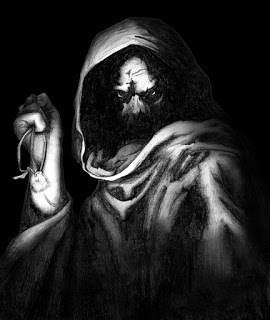 The bad guy... in case you couldn't guess.
The bad guy... in case you couldn't guess.
So what happened?
I'm glad you asked!
When Mark brought me his outline for the first book in our series he literally had a beginning and an ending, but no idea on how to get there.
So I did the writing. We'd meet, discuss our ideas, flesh out the story, and then I'd go home and write some chapters. A week or two later we'd meet and discuss what I'd written. And back and fourth we went until the manuscript was finished.
From my point of view I was the one who was living and breathing these characters. I was the one who was getting inside their heads and trying to figure out what they were thinking and what was motivating them. Mark knew them very well also, just not as good as I did. I'll understand if I sound like I'm high atop a horse here, but both Mark and I knew this was the case.
Now there comes a point with every book that I write where the characters start speaking to me. (Check out What My Non-Writing Friends Will Never Understand About Me if you're curious about how insane I am.) It usually happens if I've scripted something that goes against the grain of the character. I'll feel the character in my head saying, "No, this isn't what I want to do." And if I allow it the character takes my story in new directions far more interesting than anything I had conceived.
Mark didn't understand this. So when one of our characters started speaking to me, telling me how he wanted the story to go, Mark wasn't in agreement with the changes.
In fact, he had his own idea for a complete rewrite. He wanted to start the book over from scratch! Years of work and he wanted to start over.
I said, "No, thank you. I want to be done with this series. In fact, I want to be done with writing. We're barely breaking even on our book sales. The time and effort isn't worth it. There's no money in writing. I want to be done. I want out. We can finish what we started, but no WAY are we starting over."
And that little impasse is what pushed me into giving up on writing.
I admit, I was a bit depressed. There was other life stuff going on at the time that was stressing me out, but I think my interests were changing also. I thought my creative life was headed in a different direction.
And, honestly, it was time to go get a real job. I was an adult now and I needed money.
But my depression was about to reach new lows thanks to a little push from Stephanie Meyer, author of Twilight.
To be continued...

PS. Think it's time to give up on your dream of writing? Maybe it is. Read, Six Signs It's Time To Give Up On Writing , by Chuck Wendig, or here's a more palatable post, Signs It’s Time to Give Up on Your Dream of Being a Writer .
I've been reflecting on my journey as a writer, how psychological horror movies began influencing my style, pushing me beyond boundaries that my co-author wasn't comfortable with.
A QUICK RECAP
After my first fantasy novel had been published when I was 17, my friend Mark came to me with an idea for another fantasy novel. He knew he wasn't the strongest writer, but he had great ideas. So together we spent several years crafting a trilogy and book one was published in 2004.
OK, MOVING ON...
The publishing company we were signed with was a small outfit based in Virginia. They were putting out quality work, but they had limited resources.
They also strung us along and screwed us over, but I'll get to that.
When my co-author and I submitted a sequel to them for publication in 2010 they seemed more than excited about its quality and content. We signed a contract that stated the book had to be published within two years or we, the authors, would have the right to shop it to other publishers.
Honestly, I don't know what happened. Maybe this small little publishing company bit off more than it could chew. Maybe sales of all its books were so bad that it started to go under. Maybe the personal problems assailing the executive editor were bogging things down. All I know is that two years came and went and our sequel still wasn't published.
I had sort of given up on it anyway. My co-author and I had reached some disagreements about the resolution of the third book in our trilogy and we couldn't settle on an ending.
A few character sketches I did for our book series.
 A pensive old codger.
A pensive old codger. A dark warrior anti-hero sorta guy.
A dark warrior anti-hero sorta guy. The bad guy... in case you couldn't guess.
The bad guy... in case you couldn't guess.So what happened?
I'm glad you asked!
When Mark brought me his outline for the first book in our series he literally had a beginning and an ending, but no idea on how to get there.
So I did the writing. We'd meet, discuss our ideas, flesh out the story, and then I'd go home and write some chapters. A week or two later we'd meet and discuss what I'd written. And back and fourth we went until the manuscript was finished.
From my point of view I was the one who was living and breathing these characters. I was the one who was getting inside their heads and trying to figure out what they were thinking and what was motivating them. Mark knew them very well also, just not as good as I did. I'll understand if I sound like I'm high atop a horse here, but both Mark and I knew this was the case.
Now there comes a point with every book that I write where the characters start speaking to me. (Check out What My Non-Writing Friends Will Never Understand About Me if you're curious about how insane I am.) It usually happens if I've scripted something that goes against the grain of the character. I'll feel the character in my head saying, "No, this isn't what I want to do." And if I allow it the character takes my story in new directions far more interesting than anything I had conceived.
Mark didn't understand this. So when one of our characters started speaking to me, telling me how he wanted the story to go, Mark wasn't in agreement with the changes.
In fact, he had his own idea for a complete rewrite. He wanted to start the book over from scratch! Years of work and he wanted to start over.
I said, "No, thank you. I want to be done with this series. In fact, I want to be done with writing. We're barely breaking even on our book sales. The time and effort isn't worth it. There's no money in writing. I want to be done. I want out. We can finish what we started, but no WAY are we starting over."
And that little impasse is what pushed me into giving up on writing.
I admit, I was a bit depressed. There was other life stuff going on at the time that was stressing me out, but I think my interests were changing also. I thought my creative life was headed in a different direction.
And, honestly, it was time to go get a real job. I was an adult now and I needed money.
But my depression was about to reach new lows thanks to a little push from Stephanie Meyer, author of Twilight.
To be continued...

PS. Think it's time to give up on your dream of writing? Maybe it is. Read, Six Signs It's Time To Give Up On Writing , by Chuck Wendig, or here's a more palatable post, Signs It’s Time to Give Up on Your Dream of Being a Writer .
Published on May 16, 2016 04:13
May 9, 2016
From Un-Me To Real Me: What I Learned From Horror Movies
Part 3
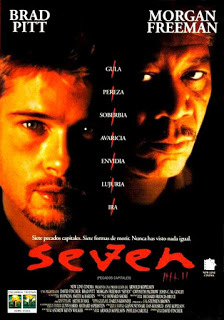 The things that disturb me the most make me think the deepest.
The things that disturb me the most make me think the deepest.
I was 15 years old when I saw the movie Se7en, with Brad Pitt, Morgan Freeman, and Kevin Spacey playing a sadistic serial killer who technically didn't kill anyone.
The weird thing about Se7en is that it didn't scare me. It disturbed me. For weeks after seeing it I couldn't get it out of my mind. It was disgusting, but it was brilliant. It was horrifying, but it was beautiful. It was directed with perfection, but it looked utterly sickening.
Other horror movies that had a similar impact on me included The Silence of the Lambs, Misery, Stir of Echoes, and In The Mouth of Madness.
Let me be clear on this one point—these movies didn't scare me. Very little scared me, in fact. At night I slept just fine, and movies rarely gave me nightmares, but I couldn't get them out of my mind. I couldn't figure out why I was so captivated by these stories and yet sickened at the same time.
It hit me in two parts.
First, I realized that these horror films were rising above the once popular slasher genre (the golden days of which were long gone) by delving into something deeper—the human psyche. To me, demons like Chucky and Freddy, monsters like Dracula, the Mummy, and the Wolfman, were nothing compared to the evil inclinations that lived inside people.
Secondly, and perhaps most importantly, I found that the movies that disturbed me the deepest taught me the most. Because after being so unsettled by something I felt compelled to figure it out. For example, after being traumatized by Se7en I dove into my Bible to learn about the Seven Deadly Sins (which are not the same ones used in the movie, by the way). But I learned something and I gained a deeper understanding of life at the same time.
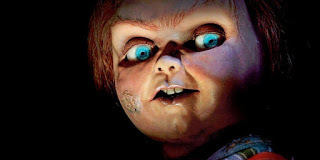
Disturbing movies were the movies that got me thinking, got me learning, got me reading, got my creative juices flowing.
Was my fascination with horror movies the best source of inspiration? No, probably not.
I believe there's a lot of truth in some of those scientific studies linking horror movies to depression, anger, and temperament. (What's Going On In Your Body When You Watch A Horror Movie, 5 Scientific Ways Watching Movies Effects You). Horror movies don't have the same impact on everyone, so take that with a grain of salt, but I don't think my binge watching horror movies was all that healthy to me at the time. There was other life stuff that was weighing me down and making me depressed.
And then the Un-me started to UNravel.
To be continued...

 The things that disturb me the most make me think the deepest.
The things that disturb me the most make me think the deepest.I was 15 years old when I saw the movie Se7en, with Brad Pitt, Morgan Freeman, and Kevin Spacey playing a sadistic serial killer who technically didn't kill anyone.
The weird thing about Se7en is that it didn't scare me. It disturbed me. For weeks after seeing it I couldn't get it out of my mind. It was disgusting, but it was brilliant. It was horrifying, but it was beautiful. It was directed with perfection, but it looked utterly sickening.
Other horror movies that had a similar impact on me included The Silence of the Lambs, Misery, Stir of Echoes, and In The Mouth of Madness.
Let me be clear on this one point—these movies didn't scare me. Very little scared me, in fact. At night I slept just fine, and movies rarely gave me nightmares, but I couldn't get them out of my mind. I couldn't figure out why I was so captivated by these stories and yet sickened at the same time.
It hit me in two parts.
First, I realized that these horror films were rising above the once popular slasher genre (the golden days of which were long gone) by delving into something deeper—the human psyche. To me, demons like Chucky and Freddy, monsters like Dracula, the Mummy, and the Wolfman, were nothing compared to the evil inclinations that lived inside people.
Secondly, and perhaps most importantly, I found that the movies that disturbed me the deepest taught me the most. Because after being so unsettled by something I felt compelled to figure it out. For example, after being traumatized by Se7en I dove into my Bible to learn about the Seven Deadly Sins (which are not the same ones used in the movie, by the way). But I learned something and I gained a deeper understanding of life at the same time.

Disturbing movies were the movies that got me thinking, got me learning, got me reading, got my creative juices flowing.
Was my fascination with horror movies the best source of inspiration? No, probably not.
I believe there's a lot of truth in some of those scientific studies linking horror movies to depression, anger, and temperament. (What's Going On In Your Body When You Watch A Horror Movie, 5 Scientific Ways Watching Movies Effects You). Horror movies don't have the same impact on everyone, so take that with a grain of salt, but I don't think my binge watching horror movies was all that healthy to me at the time. There was other life stuff that was weighing me down and making me depressed.
And then the Un-me started to UNravel.
To be continued...

Published on May 09, 2016 04:59
May 5, 2016
What My Non-Writing Friends Will Never Understand About Me
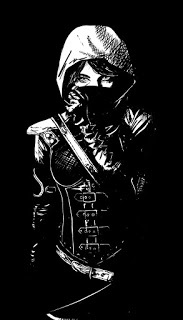 A character sketch of Lia Falls.Sometimes my characters speak to me.
A character sketch of Lia Falls.Sometimes my characters speak to me.Yes, it happens. I hear them in my head, and sometimes I talk back. I don't allow these conversations to take place in public because I'd rather not be introduced to tall men in white coats, a padded cell, and certain types of medication. So I'll carry on in private, thank you.
But maybe it is kind of crazy to have fictional characters speaking to you. Maybe it's like a multiple personality disorder. I don't really know.
All I know is that after I've imagined a character, after my conscious brain and my subconscious brain have come to a deep understanding of who the character is, I start to feel them like the memory of an old friend.
When I think of my friend Zack back in Vermont, big, tall, masculine, but with a little boy face and a teddy bear's demeanor, I can imagine him in any situation and know how he would react. A movie quote is never far from his brain. When he sticks his hands in his front pockets his thumbs always hang out. He's got a kind heart and a little boy's smile. If someone picked a fist fight with him he would try to talk his way out of it first, though I've no doubt he could lay a guy on the floor with a single blow if he wanted to. Zack is built like a grassy hillside. He may look soft on the surface, but he's a rock underneath.
Because I know Zack so well, my imagination can predict his actions. If I were to try and write a story involving him, my will would not determine his behavior. He would. I might be able to steer his actions, but his character is still going to drive his narrative.
I've had stories take drastic turns as the result of a fictional character becoming so real to me that I feel them saying, "You're writing me all wrong. I would never do that. I would do this!" And the more I listen to them and follow their character the more awesome things happen.
In Children of the Falls this happens most frequently with the character of Lia. She was the first character who really came alive to me. Right off the bat I felt like I knew who she was. I set her on her course, and I push her around with plots and tragedies, but I never need to script her response. It's probably why I enjoy writing her so much—I'm never sure what she's going to do.
I've tried explaining this to some of my non-writing friends and they just nod their heads with a somewhat vacant smile on their faces, like a person opening a Christmas gift they really don't like. "Oh, slippers. That's... nice. I guess."
So if you're reading this and you totally get it, "Greetings my fellow writing buddy! Introduce yourself in the comments below. Let's be friends."

Published on May 05, 2016 04:00
May 2, 2016
From Un-Me To Real Me: Writing For My Mother
Part 2
My first novel made it to print shortly before my eighteenth birthday. Being a teenager with a book to his credit makes one really cool really fast. My friends started looking up to me in a different way, even some adults were giving me that silent nod of approval.
The local paper did a write up about me and published an extremely unflattering photo. All my relatives bought copies of the book and...
Well, that was about it.
I was still in high school. I barely knew anything about writing books, let alone marketing one. I tried to get bookstores and libraries to let me come do signings and readings, but most didn't return my calls and the rest didn't really believe that I had actually published a book. One store owner I spoke to on the phone laughed at me. I can't really blame him. I didn't know what I was doing.
It was no big loss actually. The book was awful. My best friend at the time, Mark, told me that the story was great, but the writing was terrible.
Ahhh, honesty.
So I returned to my first love—art.
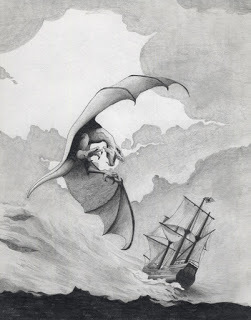 My mind was still stuck in the gutter of fantasy.
My mind was still stuck in the gutter of fantasy.
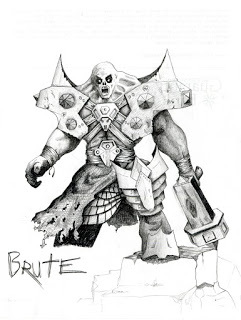 A demon/orc/monster/thing. I'm not sure
A demon/orc/monster/thing. I'm not sure
what I was thinking when I drew this. lol!
In my last year of high school I attended some writing workshops, seminars, and retreats, anything that was free that I could get my hands on. I started studying dialogue and watching more movies that were known for their depth and quality of storytelling—The Godfather, Braveheart, The Matrix, Toy Story, Reservoir Dogs... oh, and lots of horror movies.
"Wait. Horror movies with quality storytelling? You're joking, right Craig?"
It may sound strange, but the 80s and early 90s were the golden age of horror films where Hollywood did some if its best storytelling. Evil was evil back then, and horror movies depicted mankind's fight against it in a great number of ways. Sure, Nightmare on Elm Street and Friday the Thirteenth get sidelined as being mere slasher flicks, but watch Nightmare on Elm Street 3: Dream Warriors and Nightmare on Elm Street 4: The Dream Master and tell me there aren't some amazing universal truths and life parallels in there.
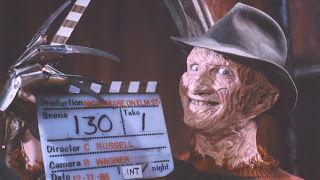 Freddy doesn't think you're ready for prime time.
Freddy doesn't think you're ready for prime time.
Freddy, Jason, Michael Meyers. They scared the bejeebers out of me, but they also helped develop my fascination with all things disturbing, which began to play into my style of storytelling.
But that didn't make my mother happy.
I remember trying to write a comic book about a trio of men who are captured, tortured, and then rebuilt into these mutant/cybernetic superheroes. The opening graphics showed them getting diced up by a bunch of robots with saw blades and machine parts.
My mother saw it and freaked out.
At the time, her approval meant a lot to me, so my fantasy writing was very watered down. I was writing what I thought my audience would tolerate—but in my mind my audience was my mother. If she approved of it I could publish it.
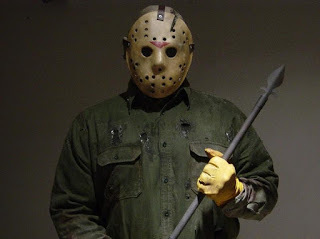 Jason Voorhees thinks you should write more horror.
Jason Voorhees thinks you should write more horror.
Eventually that same friend who told me that my first novel sucked, Mark, came to me with an idea for a book of his own. He needed help writing it because English wasn't his strongest subject. We ended up collaborating on three books, two of which were published with slightly greater success than my first minor efforts.
Still, I wasn't pushing the boundaries with my imagination like I wanted to. I wanted my medieval fantasy stuff to be more... mediEVIL. The middle ages were bleak. People were tortured in horrific ways. Children were slaughtered or died of terribly maladies. Women were raped and forced to be slaves. I wanted my stories to reflect that period and incorporate some of the horror elements I was psychologically drawn to, but Mark wanted to keep our stories watered down. Considering our family-oriented audience at the time, he was probably right, but I was ready to start tackling more mature subject matter.
Because, frankly, horror movies had taught me one very important lesson...
To be continued...

My first novel made it to print shortly before my eighteenth birthday. Being a teenager with a book to his credit makes one really cool really fast. My friends started looking up to me in a different way, even some adults were giving me that silent nod of approval.
The local paper did a write up about me and published an extremely unflattering photo. All my relatives bought copies of the book and...
Well, that was about it.
I was still in high school. I barely knew anything about writing books, let alone marketing one. I tried to get bookstores and libraries to let me come do signings and readings, but most didn't return my calls and the rest didn't really believe that I had actually published a book. One store owner I spoke to on the phone laughed at me. I can't really blame him. I didn't know what I was doing.
It was no big loss actually. The book was awful. My best friend at the time, Mark, told me that the story was great, but the writing was terrible.
Ahhh, honesty.
So I returned to my first love—art.
 My mind was still stuck in the gutter of fantasy.
My mind was still stuck in the gutter of fantasy. A demon/orc/monster/thing. I'm not sure
A demon/orc/monster/thing. I'm not surewhat I was thinking when I drew this. lol!
In my last year of high school I attended some writing workshops, seminars, and retreats, anything that was free that I could get my hands on. I started studying dialogue and watching more movies that were known for their depth and quality of storytelling—The Godfather, Braveheart, The Matrix, Toy Story, Reservoir Dogs... oh, and lots of horror movies.
"Wait. Horror movies with quality storytelling? You're joking, right Craig?"
It may sound strange, but the 80s and early 90s were the golden age of horror films where Hollywood did some if its best storytelling. Evil was evil back then, and horror movies depicted mankind's fight against it in a great number of ways. Sure, Nightmare on Elm Street and Friday the Thirteenth get sidelined as being mere slasher flicks, but watch Nightmare on Elm Street 3: Dream Warriors and Nightmare on Elm Street 4: The Dream Master and tell me there aren't some amazing universal truths and life parallels in there.
 Freddy doesn't think you're ready for prime time.
Freddy doesn't think you're ready for prime time.Freddy, Jason, Michael Meyers. They scared the bejeebers out of me, but they also helped develop my fascination with all things disturbing, which began to play into my style of storytelling.
But that didn't make my mother happy.
I remember trying to write a comic book about a trio of men who are captured, tortured, and then rebuilt into these mutant/cybernetic superheroes. The opening graphics showed them getting diced up by a bunch of robots with saw blades and machine parts.
My mother saw it and freaked out.
At the time, her approval meant a lot to me, so my fantasy writing was very watered down. I was writing what I thought my audience would tolerate—but in my mind my audience was my mother. If she approved of it I could publish it.
 Jason Voorhees thinks you should write more horror.
Jason Voorhees thinks you should write more horror.Eventually that same friend who told me that my first novel sucked, Mark, came to me with an idea for a book of his own. He needed help writing it because English wasn't his strongest subject. We ended up collaborating on three books, two of which were published with slightly greater success than my first minor efforts.
Still, I wasn't pushing the boundaries with my imagination like I wanted to. I wanted my medieval fantasy stuff to be more... mediEVIL. The middle ages were bleak. People were tortured in horrific ways. Children were slaughtered or died of terribly maladies. Women were raped and forced to be slaves. I wanted my stories to reflect that period and incorporate some of the horror elements I was psychologically drawn to, but Mark wanted to keep our stories watered down. Considering our family-oriented audience at the time, he was probably right, but I was ready to start tackling more mature subject matter.
Because, frankly, horror movies had taught me one very important lesson...
To be continued...

Published on May 02, 2016 04:12
April 29, 2016
10 Things We Hated About Selling Our New Hampshire House
And 10 Things We Loved
Our house was built in the late 1800s. The foundation was restored in the 1970s. New windows and siding were added about ten years before we bought it.
Despite how new it looked, the house had old bones. Seriously old bones. And the amount of upkeep required was wearing us down. Dani hated having to pay for the cost of repairs, and I hated doing most of the repairs. (I am NOT a handyman.) The mortgage wasn’t so bad, but it was getting expensive just to maintain the property. We also didn’t like being so far away from our families, our church, and my job. Gas prices were killing us!
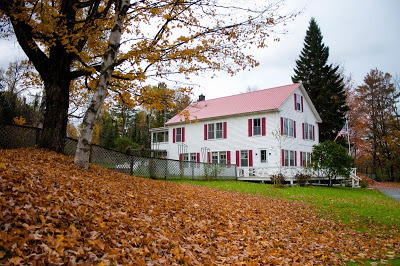
As much as Dani and I loved our 4-bedroom home on its 4 acres of beautiful grassy hillside property, we were starting to resent the amount of work it was costing us. And after going through Dave Ramsey’s Financial Peace University we became convinced that living in debt to our house wasn’t the best place to be investing so much of our finances.
So we made the decision to sell.
Our realtor seemed convinced that the house would be a quick sale. It was in a prime spot. It had lots of space. It was affordable. She expected it to sell within three months.
Well it took almost ten months! Ten months of showings and offers and waiting and things not working out. Ultimately, selling the house proved to be a bag of mixed feelings.
Here are 10 things that we LOVED and 10 things that we HATED about selling our house.
10 Things That We Hated
1. Paying for it.Dani and I moved in with my Grandma after we decided to sell, and paying for a mortgage on a house that we weren't living in became kind of a drag.
2. The constant showings.I really wanted the house to be sold before winter, because I knew if it didn’t I’d be making frequent trips to the house to shovel out the walkways and do fairly regular check-ups in case the realtor had a showing. Well, that’s EXACTLY what I ended up doing because the house didn't sell before winter.
3. Never-ending “house” questions.We were fortunate to have a lot of people praying for us as the struggle to sell our house became more problematic, but that meant answering questions like “Did you sell the house yet?” or “How’s the house sale going?” about ten times a day, more on weekends. My unchanging response of “No movement yet,” got REALLY old.
4. Realtor’s giving us false hope.I don’t know what other people’s experiences have been like with realtors, but we got the feeling our realtor was giving us a lot of sweet frosting on top of what was, otherwise, a stale cake. Every time she had a showing she’d make a big deal of it. Every time she spoke to potential buyers she made it sound like they were REALLY interested. Ok, well, why aren’t we getting any offers if so much great stuff is happening.
5. Packing and packing and packing.When we moved to Grandma’s we left a lot of our stuff in the house because our realtor said if the rooms looked like they were being lived in it would make it easier for buyers to imagine their own lives there. Still, every time I’d go visit the house I’d try to pack up some boxes to put in storage—dishes, movies, bedding, office stuff. Bit by bit. Little bit little. Ugh.
6. Hearing what the buyers didn’t like.Our house was an old house. Old houses have slanted floors, old knob and tube wiring, funky baseboard heating, and many other oddities that you just don’t find in modern homes. And you know what, that stuff is fine. The inspector might throw a fit if he sees old wiring, but that wiring has been there for decades. It's not plugged in and it's not going to hurt anyone. My Grandma’s house is filled with old wiring. So is Dani's parents' house. It’s fine. Ignore it. It’s in the walls. It’s hidden. It’s not a big deal. But buyers would freak out about that stuff, stuff we couldn’t really do anything about. I’m sorry, I’m not ripping apart all the sheetrock to make sure there’s no old wiring.
7. Itty bitty living space.We went from a 4-bedroom, 2,400-square-foot home to a tiny little one bedroom space at Grandma’s. We shared the kitchen with her. We shared the bathrooms. I had lived with Grandma back when I was single, and she’s the sweetest most generous lady in the world, but being married is different. Sometimes there just wasn’t enough space.
8. Making sure the house was clean.Every time there was a showing I’d have to go over to the house and clean up—rake the yard, mow the lawn, shovel snow, dust, vacuum, and do whatever needed to be done. Sure, we weren’t living there, but that doesn’t mean that all maintenance had to stop. I began to feel like a maid service.
9. Waving goodbye to opportunity.Every time a buyer would pass on the house or we’d hear about another house in our neighborhood that sold, we’d get this feeling of sadness because there went another opportunity. We'd say to ourselves, “If only we had done THIS,” or “Maybe if we had tried THAT,” then maybe we would’ve got the sale.
10. Haggling over prices.Buyers always ask for the price to be lowered. Always. They’ll find any contingency they can just to get you to come down $3,000 or $5,000. We expected that. What we didn’t expect was the stupid reasons they would find to have the price lowered. Our realtor would say, “They’re offering THIS MUCH, but only if the cement slab the old shed is on is removed,” or “They like the property, but they want you to knock of $2,000 to replace the latticework on the porch.” *palms face*

Our beautiful backyard with over an acre of green grass, lilac bushes, raspberries, grapes, and gardening space.

The path leading up to the woods. Another three acres to roam around on, snowshoe, hike, and explore.

Our big old New Hampshire house in spring.
10 Things That We Loved
1. Learning what we really want.Living in that house for three years taught us a lot about what we really want out of home.
2. Grandma.She loved having us live with her, helping around the house, mowing the lawn, shoveling snow, and we loved living with her rent free, which was a HUGE help because we were still paying our mortgage.
3. Having time to breath.While living at our house we were so preoccupied with leaks in the basement, peeling paint, snow on the porch, and ticks in the backyard, that we sort of lost our vision for our family. Selling the house and living with Grandma for a year gave us the *inhales long and slow* that we needed.
4. Being closer to family.We were about half an hour from anything—my work, my family, Dani’s family, our church. So moving closer to all of that was a huge bonus!
5. Learning more about each other.I was the one who complained the most about our old house, but when it came to selling it I had the hardest time letting go. Dani, on the other hand, complained the most about selling it—about having to pack everything up, about the process of moving, about the pains of waiting and wondering and hoping for the house to sell. When it did finally sell, she was the happiest. It was funny how we approached the situation so differently.
6. All of our caring friends.The same group of friends who prayed with us when we bought the house, also prayed for us as we went through the process of selling it. I was afraid they would laugh at us. “You wanted this house so bad a few years ago, and now you want to sell it?! What’s wrong with you?” But they were all very gracious, generous, helpful, and understanding.
7. Learning to rely on God.Selling our home was a situation that was truly beyond our control. All we could do is wait and trust and hope that he would bring along the right buyer at the right time. And he did!
8. Mowing Grandma’s lawn.I grew up playing in that yard. My Grandpa (who passed away a few years ago) taught me how to use a riding lawn mower in the yard. And I spent many years helping him maintain it as a teenager. Returning to that property and caring for the lawn made me feel close to him again, even though he was gone. I don’t think I ever enjoyed mowing grass as much as I did those two summers we lived with Grandma.
9. Being with family.Grandma’s house is pretty much the epicenter of the Grant family. All my uncles and many of my cousins pass through that house weekly. It was fun getting to see so much of family. It was like God knew we were going to be moving 4,900 miles away soon and he was giving us that year to spend with them all.
10. Saving money.After our house sold we lived with Grandma for a while longer. It was nice not having any debt, no mortgage, and no rent. We were able to save our money as we planned for our next stage in life.
I can sound like an ungrateful prude, I know. We owned a house. We were blessed. I get that. And looking back I can see that I worried and grumbled a LOT more than I should have.
It's life experiences like this that help us appreciate what we do or don't have. Every moment is a gift, every thing we own and every breath we take is a blessing.
I'm excited to see what's in store for us next.

Our house was built in the late 1800s. The foundation was restored in the 1970s. New windows and siding were added about ten years before we bought it.
Despite how new it looked, the house had old bones. Seriously old bones. And the amount of upkeep required was wearing us down. Dani hated having to pay for the cost of repairs, and I hated doing most of the repairs. (I am NOT a handyman.) The mortgage wasn’t so bad, but it was getting expensive just to maintain the property. We also didn’t like being so far away from our families, our church, and my job. Gas prices were killing us!

As much as Dani and I loved our 4-bedroom home on its 4 acres of beautiful grassy hillside property, we were starting to resent the amount of work it was costing us. And after going through Dave Ramsey’s Financial Peace University we became convinced that living in debt to our house wasn’t the best place to be investing so much of our finances.
So we made the decision to sell.
Our realtor seemed convinced that the house would be a quick sale. It was in a prime spot. It had lots of space. It was affordable. She expected it to sell within three months.
Well it took almost ten months! Ten months of showings and offers and waiting and things not working out. Ultimately, selling the house proved to be a bag of mixed feelings.
Here are 10 things that we LOVED and 10 things that we HATED about selling our house.
10 Things That We Hated
1. Paying for it.Dani and I moved in with my Grandma after we decided to sell, and paying for a mortgage on a house that we weren't living in became kind of a drag.
2. The constant showings.I really wanted the house to be sold before winter, because I knew if it didn’t I’d be making frequent trips to the house to shovel out the walkways and do fairly regular check-ups in case the realtor had a showing. Well, that’s EXACTLY what I ended up doing because the house didn't sell before winter.
3. Never-ending “house” questions.We were fortunate to have a lot of people praying for us as the struggle to sell our house became more problematic, but that meant answering questions like “Did you sell the house yet?” or “How’s the house sale going?” about ten times a day, more on weekends. My unchanging response of “No movement yet,” got REALLY old.
4. Realtor’s giving us false hope.I don’t know what other people’s experiences have been like with realtors, but we got the feeling our realtor was giving us a lot of sweet frosting on top of what was, otherwise, a stale cake. Every time she had a showing she’d make a big deal of it. Every time she spoke to potential buyers she made it sound like they were REALLY interested. Ok, well, why aren’t we getting any offers if so much great stuff is happening.
5. Packing and packing and packing.When we moved to Grandma’s we left a lot of our stuff in the house because our realtor said if the rooms looked like they were being lived in it would make it easier for buyers to imagine their own lives there. Still, every time I’d go visit the house I’d try to pack up some boxes to put in storage—dishes, movies, bedding, office stuff. Bit by bit. Little bit little. Ugh.
6. Hearing what the buyers didn’t like.Our house was an old house. Old houses have slanted floors, old knob and tube wiring, funky baseboard heating, and many other oddities that you just don’t find in modern homes. And you know what, that stuff is fine. The inspector might throw a fit if he sees old wiring, but that wiring has been there for decades. It's not plugged in and it's not going to hurt anyone. My Grandma’s house is filled with old wiring. So is Dani's parents' house. It’s fine. Ignore it. It’s in the walls. It’s hidden. It’s not a big deal. But buyers would freak out about that stuff, stuff we couldn’t really do anything about. I’m sorry, I’m not ripping apart all the sheetrock to make sure there’s no old wiring.
7. Itty bitty living space.We went from a 4-bedroom, 2,400-square-foot home to a tiny little one bedroom space at Grandma’s. We shared the kitchen with her. We shared the bathrooms. I had lived with Grandma back when I was single, and she’s the sweetest most generous lady in the world, but being married is different. Sometimes there just wasn’t enough space.
8. Making sure the house was clean.Every time there was a showing I’d have to go over to the house and clean up—rake the yard, mow the lawn, shovel snow, dust, vacuum, and do whatever needed to be done. Sure, we weren’t living there, but that doesn’t mean that all maintenance had to stop. I began to feel like a maid service.
9. Waving goodbye to opportunity.Every time a buyer would pass on the house or we’d hear about another house in our neighborhood that sold, we’d get this feeling of sadness because there went another opportunity. We'd say to ourselves, “If only we had done THIS,” or “Maybe if we had tried THAT,” then maybe we would’ve got the sale.
10. Haggling over prices.Buyers always ask for the price to be lowered. Always. They’ll find any contingency they can just to get you to come down $3,000 or $5,000. We expected that. What we didn’t expect was the stupid reasons they would find to have the price lowered. Our realtor would say, “They’re offering THIS MUCH, but only if the cement slab the old shed is on is removed,” or “They like the property, but they want you to knock of $2,000 to replace the latticework on the porch.” *palms face*

Our beautiful backyard with over an acre of green grass, lilac bushes, raspberries, grapes, and gardening space.

The path leading up to the woods. Another three acres to roam around on, snowshoe, hike, and explore.

Our big old New Hampshire house in spring.
10 Things That We Loved
1. Learning what we really want.Living in that house for three years taught us a lot about what we really want out of home.
2. Grandma.She loved having us live with her, helping around the house, mowing the lawn, shoveling snow, and we loved living with her rent free, which was a HUGE help because we were still paying our mortgage.
3. Having time to breath.While living at our house we were so preoccupied with leaks in the basement, peeling paint, snow on the porch, and ticks in the backyard, that we sort of lost our vision for our family. Selling the house and living with Grandma for a year gave us the *inhales long and slow* that we needed.
4. Being closer to family.We were about half an hour from anything—my work, my family, Dani’s family, our church. So moving closer to all of that was a huge bonus!
5. Learning more about each other.I was the one who complained the most about our old house, but when it came to selling it I had the hardest time letting go. Dani, on the other hand, complained the most about selling it—about having to pack everything up, about the process of moving, about the pains of waiting and wondering and hoping for the house to sell. When it did finally sell, she was the happiest. It was funny how we approached the situation so differently.
6. All of our caring friends.The same group of friends who prayed with us when we bought the house, also prayed for us as we went through the process of selling it. I was afraid they would laugh at us. “You wanted this house so bad a few years ago, and now you want to sell it?! What’s wrong with you?” But they were all very gracious, generous, helpful, and understanding.
7. Learning to rely on God.Selling our home was a situation that was truly beyond our control. All we could do is wait and trust and hope that he would bring along the right buyer at the right time. And he did!
8. Mowing Grandma’s lawn.I grew up playing in that yard. My Grandpa (who passed away a few years ago) taught me how to use a riding lawn mower in the yard. And I spent many years helping him maintain it as a teenager. Returning to that property and caring for the lawn made me feel close to him again, even though he was gone. I don’t think I ever enjoyed mowing grass as much as I did those two summers we lived with Grandma.
9. Being with family.Grandma’s house is pretty much the epicenter of the Grant family. All my uncles and many of my cousins pass through that house weekly. It was fun getting to see so much of family. It was like God knew we were going to be moving 4,900 miles away soon and he was giving us that year to spend with them all.
10. Saving money.After our house sold we lived with Grandma for a while longer. It was nice not having any debt, no mortgage, and no rent. We were able to save our money as we planned for our next stage in life.
I can sound like an ungrateful prude, I know. We owned a house. We were blessed. I get that. And looking back I can see that I worried and grumbled a LOT more than I should have.
It's life experiences like this that help us appreciate what we do or don't have. Every moment is a gift, every thing we own and every breath we take is a blessing.
I'm excited to see what's in store for us next.

Published on April 29, 2016 04:07
April 25, 2016
From Un-Me To Real Me: Discovering My Passion For Writing
Part 1
For as long as I can remember I've had two passions: art and writing.
Ever since I could hold a crayon I've been drawing. Everything my eyes could see I drew. As a teenager I didn't go out and party on Friday nights because I didn't care about that stuff. I cared about art. My eyes couldn't stop looking around and my fingers couldn't stop interpreting what my eyes were seeing.
 An old pencil sketch.
An old pencil sketch.
My interest in the visual medium turned to movies. I was obsessed with the old Disney animated classics like Aladdin, The Little Mermaid, and Beauty and the Beast. I wanted to tell stories through the art of filmmaking.
But there was one little problem. Hollywood.
Even as a teenager I was able to recognize that Hollywood was a dump. The masquerading and narcissism and lying and whoring and nonsense required to make it in Hollywood was sickening to me. I admire anyone who can endure that kind of treatment and posturing, but it's not what I was cut out for.
As a kid from Nowhereville, Vermont I would have to work doubly hard just to get to Hollywood, not to mention figuring out how to get involved in movies.
This was before the days of the internet where everything you ever wanted to know was at your fingertips. I had no idea that there were schools for animation and movie making.
This is an old fight scene I filmed with a friend of mineas part of a movie we made when we were teenagers.We were our own gang, and this was our drug!
But I had all these stories that I could see in my head. They'd play through my brain like movies.
And so I started writing them down.
I wrote my first novel at the age of 14. It was called Unknown, and it was about two teenagers who spend a horrifying night barred up in a tree house as an unknown creature of some sort tries to get in and rip them to shreds. I wrote it on an old DOS computer before the days of Microsoft Worthless and Spellmesser. I think the novel was about 65,000 words. Not bad for a first time effort.
And then the computer I was working on crashed and all of my data was lost.
I moped about it for a while, but I started writing again, this time in what would become my genre of choice, medieval fantasy. I was inspired by—as most all fantasy writers are—The Chronicles of Narnia, The Lord of the Rings, and newer works like R.A. Salvatore's The Dark Elf series.
My second novel was 95,000 words, and I submitted it for publication when I was 16. After about four rejection letters I got an email from a small company called EricaHouse. They specialized in first time authors. They liked that I was so young and showed so much potential. They liked my book and wanted to publish it.
What should've been a great opportunity turned into a lesson for the naive.
To be continued...

For as long as I can remember I've had two passions: art and writing.
Ever since I could hold a crayon I've been drawing. Everything my eyes could see I drew. As a teenager I didn't go out and party on Friday nights because I didn't care about that stuff. I cared about art. My eyes couldn't stop looking around and my fingers couldn't stop interpreting what my eyes were seeing.
 An old pencil sketch.
An old pencil sketch.My interest in the visual medium turned to movies. I was obsessed with the old Disney animated classics like Aladdin, The Little Mermaid, and Beauty and the Beast. I wanted to tell stories through the art of filmmaking.
But there was one little problem. Hollywood.
Even as a teenager I was able to recognize that Hollywood was a dump. The masquerading and narcissism and lying and whoring and nonsense required to make it in Hollywood was sickening to me. I admire anyone who can endure that kind of treatment and posturing, but it's not what I was cut out for.
As a kid from Nowhereville, Vermont I would have to work doubly hard just to get to Hollywood, not to mention figuring out how to get involved in movies.
This was before the days of the internet where everything you ever wanted to know was at your fingertips. I had no idea that there were schools for animation and movie making.
This is an old fight scene I filmed with a friend of mineas part of a movie we made when we were teenagers.We were our own gang, and this was our drug!
But I had all these stories that I could see in my head. They'd play through my brain like movies.
And so I started writing them down.
I wrote my first novel at the age of 14. It was called Unknown, and it was about two teenagers who spend a horrifying night barred up in a tree house as an unknown creature of some sort tries to get in and rip them to shreds. I wrote it on an old DOS computer before the days of Microsoft Worthless and Spellmesser. I think the novel was about 65,000 words. Not bad for a first time effort.
And then the computer I was working on crashed and all of my data was lost.
I moped about it for a while, but I started writing again, this time in what would become my genre of choice, medieval fantasy. I was inspired by—as most all fantasy writers are—The Chronicles of Narnia, The Lord of the Rings, and newer works like R.A. Salvatore's The Dark Elf series.
My second novel was 95,000 words, and I submitted it for publication when I was 16. After about four rejection letters I got an email from a small company called EricaHouse. They specialized in first time authors. They liked that I was so young and showed so much potential. They liked my book and wanted to publish it.
What should've been a great opportunity turned into a lesson for the naive.
To be continued...

Published on April 25, 2016 04:16
April 15, 2016
My Pregnant Wife Might Think This Comparison Is Odd
Labor pains.
No man on earth will ever know what those are like. We know that. We get it. But laboring to create something and then finally seeing it born? I think there are ways us men can relate.
Maybe. My wife will probably disagree with me.
But I digress.
They arrived today! Two beautifully printed volumes of an epic journey, the first leg of which I have only just completed. I'm so thrilled to finally be able to share these with readers.
Years from now, when my son is older, I'll say, "The day I held you in my arms after you were born was the happiest day of... no, wait. That's when my books arrived in the mail."
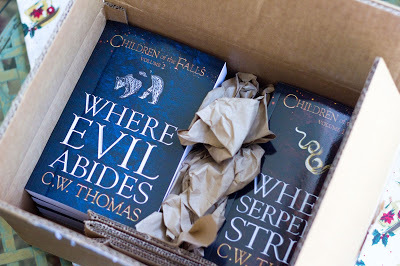

No man on earth will ever know what those are like. We know that. We get it. But laboring to create something and then finally seeing it born? I think there are ways us men can relate.
Maybe. My wife will probably disagree with me.
But I digress.
They arrived today! Two beautifully printed volumes of an epic journey, the first leg of which I have only just completed. I'm so thrilled to finally be able to share these with readers.
Years from now, when my son is older, I'll say, "The day I held you in my arms after you were born was the happiest day of... no, wait. That's when my books arrived in the mail."


Published on April 15, 2016 04:25
April 8, 2016
8 Things We've Learned About Maui
 There is no such thing as a perfect paradise on Earth, but Maui comes pretty darn close. Warm ocean waters teeming with beautiful sea life. Breathtaking views from all over the island. Food so good you'll think you're dreaming. And enough zip-lining, boat-riding, parasailing, surfing, swimming, hiking, and sun-tanning to occupy adventurists of any age.
There is no such thing as a perfect paradise on Earth, but Maui comes pretty darn close. Warm ocean waters teeming with beautiful sea life. Breathtaking views from all over the island. Food so good you'll think you're dreaming. And enough zip-lining, boat-riding, parasailing, surfing, swimming, hiking, and sun-tanning to occupy adventurists of any age.Ultimately—as our chill surf instructor would say—"It's all cool, bro."
Still, this paradise isn't without its drawbacks. I'm totally nitpicking here, but for anyone looking to vacation on Maui, here are 8 things you might want to keep in mind.
1. Bad DirectionsFor some reason the locals don't know how to give directions, so if you get directions, make sure they are very, very specific. Because sometimes "hang right and it's on your left" really means "turn right, drive two miles, you'll see a really complicated intersection with lots of touristy stuff, but if you turn left down the really narrow one way road that you can't really see because of the palm trees and keep your eyes looking to the left you'll eventually see a really small building with a tiny pink sign that says Hala-ooh-I-Can't-Pronounce-This-Word in minuscule print and that'll be right next to where you want to go."
Other times it's as simple as, "See that sign that says, 'Do not enter'? Enter there." (Seriously, someone said that to us, but, hey, it got us where we wanted to go.)
2. Beware the Tip JarMaui is all about tourism, which means most of the locals work in the service industry and thrive off tips.
This gets especially irritating when you book a tour as part of a "package deal," like we did with our sunrise/bicycle/zip line tour. We had no less than five different people to tip—the bus driver who picked us up, the sunrise tour guide, the bicycle tour guide, the zip line guys, and the driver who took us back. We didn't have enough cash to tip everyone, but if we had that would've easily been $80 in tips to three different companies for one excursion.
3. Timeshare DiscountsDanielle and I wanted to go on a whale-watching tour, so we went to Boss Frog's, one of Maui's top tourism meccas for anything and everything you want to do.
A Super cool dude named Mark said he had a great deal for us—a $140 dinner cruise on which we would see whales for $12 if we agreed to sit through a timeshare presentation for 90 minutes. Ninety minutes. That's nine, zero. Super Cool Mark told us if they didn't hold to that to let him know.
Dinner, a boat ride, whales, all for $12? I can suffer a 90-minute blowhard, sure.
But the dinner cruise was a disappointment. It wasn't technically a "whale watching tour," so the captain wasn't obligated to seek out whales. We saw some way out on the horizon, but not as up close as the official whale-watching boats. The food was mediocre, the drinks were disappointing, and don't even get me started on the timeshare people who did not stick to their 90-minute promise—two hours and ten minutes later we were still listening to their spiel.
Back to Super Cool Mark.
When we told him about our disappointing experience he did us a solid and sent us on a whale-watching tour at 50 percent off the listed price. Thanks, dude!
4. Rent a car.Don't argue. Just do it.If you go to Maui, rent a car. There shouldn't be any ifs, ands, or buts about it. Your own transportation is a must. Taxis are expensive. Buses are scattered and slow. And you might have a hotel with a very rocky beach when there is a silky, sandy beach just two miles down the road. Fortunately a car came with our vacation package, and we used it every day.
5. Read the Fine PrintI knew my beach-loving wife would want a hotel room next to the ocean, so when I booked the hotel I was sure to note that I wanted a room with an "oceanfront room."
The room we got was TECHNICALLY on the oceanfront, but only because the building it was in was an oceanfront building. The room itself faced the parking lot!
I doubt it was the intention of the hotel owners to be misleading in this way. It was likely Expedia's fault for not communicating to the hotel that we had selected an oceanfront room, or perhaps Expedia duped us.
Whatever the case, when I showed the lady at the hotel's front desk my receipt for the room and that it very clearly said "oceanfront" she quickly and kindly moved us to a much better room with a majestic view of the Pacific.
So be careful when you book to read the fine print, but don't be afraid to inquire about discrepancies.
6. Lost in TranslationSpeaking of communication errors, we noticed several times there was a breakdown in communication between companies—whether it was between Expedia and our hotel, the timeshare people and Super Cool Mark, or the three different companies operating our sunrise/bicycle/zip line tour.
It seemed like everyone was on their own schedules, but no one was on anybody else's.
When so many cooks are stirring the pot there needs to be better communication.
That goes for websites, too. Three times we encountered situations where what we got was not what was offered on the website—not the least of which was Anthony's, a little hippie cafe that offered picnic lunches with rentable coolers on their website. When we stopped there on the Road to Hana, we found out that lunches were more expensive than the website listed, and cooler rentals were no longer an option. You had to buy one for $8. The food wasn't that great either.
7. Hawai'i is Not AmericaYes, I know Hawai'i is PART of America, but it's culture is so far removed from anything American that you'll sometimes feel like you're in a different country. Most road signs are in Hawaiian. Most locals speak Hawaiian—or some form of the Asian language. Most Hawaiians have no clue about life on the mainland. They have their own customs and quirks that can be frustrating if you're not expecting it.
8. Aloha ... You Dumb TouristHawaii might be called The Aloha State, but real Hawaiians don't seem to say, "Aloha." Trust me, as a tourist, you'll get Alohaed at every corner, but if you start saying it back you'll stick out like a sore thumb.
Real Hawaiians say, "What's up, brudda!" or "What's up, sister!" They're also fond of "Hello," "Hi," and the more modern, "Hey!"
Oh, and if you think about flashing the "hang loose" hand sign, it's ok. Everybody does it. But you're not in Southern California, so don't call it "hang loose." In Hawai'i, it's the Shaka.

Published on April 08, 2016 04:33
March 19, 2016
Is This The Beginning or the End?
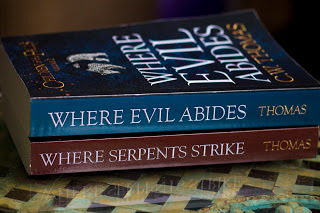 It's been about seventeen months writing books one and two (172,290 words and 187,200 words respectively), a total of 359,490 words in about a year and a half. By comparison the first Harry Potter book was only 77,000 words, but book 5 was 257,000.
It's been about seventeen months writing books one and two (172,290 words and 187,200 words respectively), a total of 359,490 words in about a year and a half. By comparison the first Harry Potter book was only 77,000 words, but book 5 was 257,000.To say I'm excited is an understatement. It may have been seventeen months of writing, but it's been almost nine years of world building. From a tiny concept of a story to an outline for a trilogy to a "Ah, the hell with it! Let's make a whole series!" kind of attitude, the series has birthed and is ready to fly.
Some people have asked me if I'm writing this series on a book-by-book basis, and the answer is no. I've got an end game in sight. I know the fate of every character and what the last scene on the last page of the last book will be. Granted as the creative process unfolds some things might change—in fact I know they will—but I think my road map is pretty well set.
I say this because I think it's more exciting knowing when an author has a plan. Knowing that the author isn't just waiting for another brilliant idea to strike, but that he knows what he wants to say makes for a more interesting reading experience.
Whatever your opinion on that matter, I hope you enjoy what's to come. Both books are now available on Amazon in print and digital formats.
Where Serpents Strike: Children of the Falls, Vol. 1
http://amzn.com/B01BZVIHG6
Where Evil Abides: Children of the Falls, Vol. 2
http://amzn.com/B01D6EF6I2

Published on March 19, 2016 15:00



